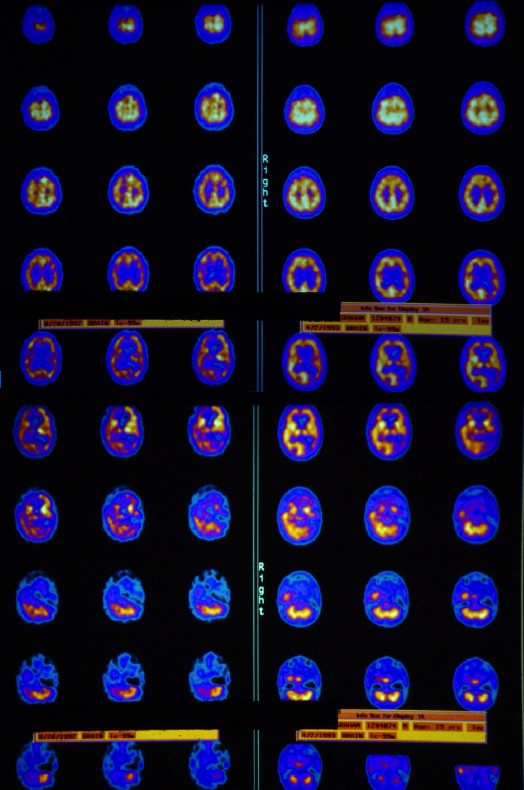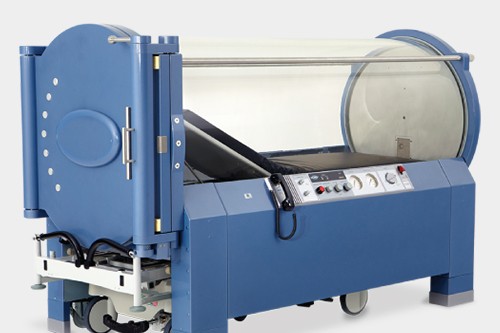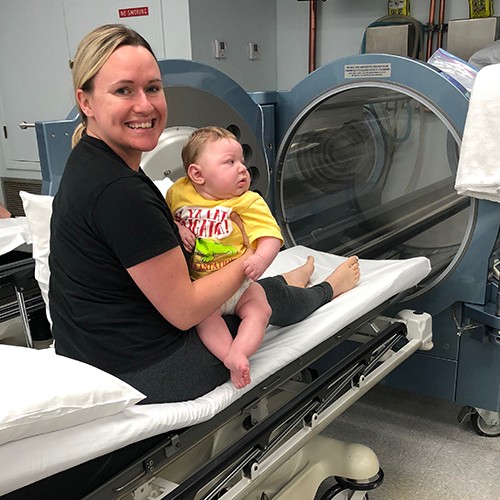Hi, I’m Eileen Geller, a Seattle-RN and mom of Nate, who is now 13 years old. I understand you have some questions about the potential use of hyperbaric oxygen therapy for your nephews, one of whom has lost his eyesight. I am most happy to speak to you or to your sister or one of your other family members about Nate’s experience. Perhaps it might also be helpful for me to provide a brief written overview of Nate’s experience so you can pass this on in advance of a phone call. At 10 years old Nate received a brain injury playing lacrosse. He had some pretty severe after-effects, including physical debility, pain, balance, hearing, and cognitive function loss. The most severe problem involved vision. Nate’s entire peripheral vision was knocked out by the injury—he had only an inch in front if each eye with mostly clear sight, the rest of his vision was totally opaque and spinning constantly. They determined the hit had knocked out his brain’s ability to determine visual vergence, among other problems. For a year and a half we went to a slew of doctors, neurologists, ophthalmologists, optometrists, and other specialists. Eventually we went to a physician my ophthalmologist neighbor and friend called “the god of eye doctors.” This fellow actually told Nate to his face that his vision would “never ever improve.”
As an RN who, prior to Nate’s injury, had directed a major medical center’s palliative care team and run several organizations to improve support during injury, illness, and grief, I had a wealth of medical experience and contacts to utilize on Nate’s behalf. Because I come from a conventional medical model, it was natural for me to first seek intensive rehab and medical and pharmacological support for Nate. Over the course of the first year and a half after his injury, we’d seen a plethora of clinical practitioners, all of whom confirmed both that there was no curative treatment for Nate’s brain injury and eyesight, and that the only treatment for brain injuries like his was supportive care, rehab, medications. They counseled patience over the long haul and hope he would improve somewhat over time. Some of his symptoms did improve, slowly over time with medication, rehab, and other therapies, but his eyesight never, ever improved, even a little, from the immediate after effects of his injury.
Finally, in October of last year, I embarked on an intensive, 10 hour a day schedule of medical journal research for several weeks. I read well over 500 medical journal articles and perused and reviewed many more, all of which were on the subject of brain injuries, neurology, vision loss, rehab, treatment, and medications. Eventually I previewed an article by Dr. Paul Harch of New Orleans about the use of hyperbaric oxygen therapy in brain injuries as an alternative treatment. The article was about to be published in the prestigious Journal of Neurotrauma. The results were extremely positive–not only did the post-brain injured veterans self-report to being better and feeling better, but the SPECT scans of their brains confirmed improved oxygenation and circulation to the damaged parts of their brains. I then extensively researched both Dr. Harch and other practitioners of hyperbaric therapy, reading a multitude of national and international articles about the subject ranging back 20 years. What I read convinced me that hyperbaric therapy was worth a try. Since Nate’s vision issues were so critical, we wanted to have the therapy done by the physician my research showed me to be one of the best (if not the best) in the world, with more than twenty years experience, Dr. Paul Harch. Traveling to New Orleans from Seattle with Nate would be tough, but it seemed like the only chance for a curative therapy, one that might actually help improve his eyesight and other brain injury symptoms.
First we decided to check with Nate’s Seattle physicians. They were (almost) universally opposed to the decision; worried he would have seizures or even loose his eyesight all together. When I weighed their general input against the hard data and research I’d collected, it seemed clear their opposition was based not on the physics, medical science, or data on hyperbaric oxygen therapy in brain injuries, but simply on lack of knowledge accompanied by some bias. These doctors had been willing to put Nate on a slew of medications for life, many of which were considered off-label for brain injuries, but not willing to consider a therapy which has been around 30 years, has a minimum of side effects when done by an experienced physician, has the lowest malpractice insurance of practically any medical specialty because it is so low risk, and has a proven track record of improving the condition of people with brain injuries. Finally, I went to a neurologist who’d been a military doctor in Iraq and Afghanistan who had seen literally thousands of brain injured veterans. He said if it were his boy, he’d try hyperbaric oxygen therapy. After all, he said, “It’s been around forever, has an incredibly low incidence of side effects, and it is the only therapy which offers a hope for measurable improvement for Nate. Why not try it?”
And so we did, even though, with a job, three other children, and ill and elderly parents who need my help, it wasn’t easy to migrate across the country for medical treatment that would last five weeks. Until I am a hundred years old, it will have been the best decision I will ever make. Nate, who was so seriously impaired that one of his therapists said he was the sensorial equivalent of a C1 quadriplegic, is now, after 80 hyperbaric treatments, 90% better. His physical mobility and balance are much improved, his cognitive function so well he is getting A’s and B’s in school, his chronic, severe, unremitting headaches gone, and, his eyesight dramatically better. He went from not being able to see the difference between a pickup truck and a compact car to being able to read, in regular print, the Hunger Games. According to Nate, “Dr. Harch gave me back my life.”
In Dr. Harch’s waiting room, I saw many patients become much better, including a 10 month old with cerebral palsy who’d been certified by several prominent ophthalmologists to be cortically blind. This child, after hyperbaric therapy, was examined by those same doctors who said they’d never seen anything like it, but confirmed she’d regained 100% of vision in one eye and the other was much improved. If I had any loved one with a brain injury, I would send him to see Dr. Harch right away. Since we’ve been home, we’ve helped 15 or 20 friends or people we know receive hyperbaric therapy, including my dear friend who had four children injured in a car accident. All have evidenced improvement.
Please feel free to contact me with any further questions at http://waitingroomwisdom.tumblr.com/
Take care,
Eileen Geller



